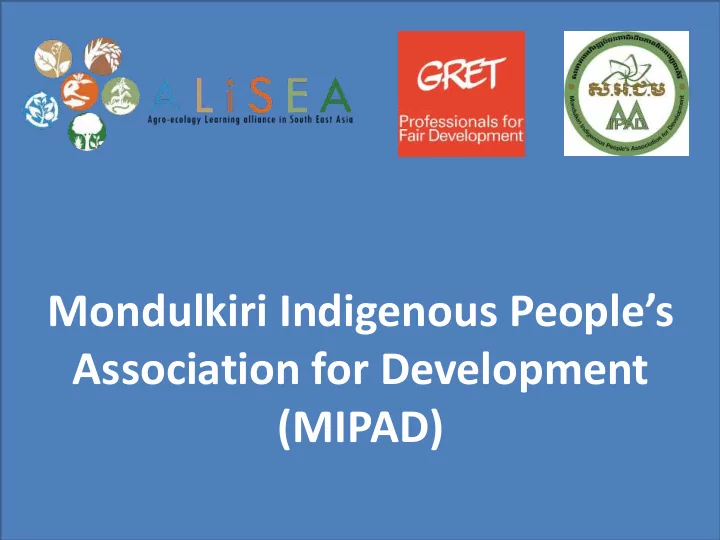

Mondulkiri Indigenous People’s Association for Development (MIPAD)
Project title Bridging Agriculture to Ecology Conservation Among Indigenous People Communities in Mondulkiri Province (Ecoagriculture)
Our Identity
Mondulkiri Indigenous People’s Association for Development (MIPAD) is an indigenous people-group member- based organization located in Mondulkiri province
About The Project Project title Bridging Agriculture to Ecology Conservation Among Indigenous People Communities in Mondulkiri Province (Eco-agriculture)
GOAL The Project goal is to introduce high value crops such as strawberry for permaculture system inside community forestry for indigenous people community so that they can increase their productivity yet promote soil ecology system through systematic organic mulching system for their vegetable beds.
approach & methodology and major activities Educate and training on concept of permaculture to indigenous people & farmers in hilly areas , focusing on organic mulching which use less water, have effective weeds control and save drudgery work Introduce high commercial value crops, fruits such as strawberry farming among indigenous people communities Develop pilot test or demonstration model of permaculture and eco-agriculture Help potential indigenous people farmers, mainly women to implement permaculture and eco-agriculture Documentation of lesson learn and success story
Why Eco-Agriculture for Indigenous People 1- They are living in the forest , often hot-sport of biodiversity 2- They depend almost totally on forest resources for their food / housing / way of life 3-But in this modern integrated economy, Forest resources can not meet all economic need , so there is need of new viable initiatives to produce more food and commercial products and eco-agriculture seems a very viable option for indigenous people. Extra: We also introduce green-light (solar) To reduce fire-wood consumption
Why Eco-Agriculture Thatch Meadow for roofing Indigenous people housing strongly depend on natural resources Bamboo for structure
Almost 100% of housing material from local natural resources
Agriculture is still ancient , not permanent based on poor knowledge and know-how Very low yield Can not substitute forest resources Permaculture & eco-agriculture in one of the viable solution
There is a need to preserve forest for their housing / food sources
Forest based food plants II. Meat Paste Bamboo Shoot I. Sour Bamboo Shoot
But forest can not provide enough food / housing material and house hold need in this modern economy They need extra food / income
What we have done so far Research and documentation of forest based food plants Plan to domesticate wild-food plants in the village One Pilot model of wild – medicinal plant farm developed in the village OUR RESEARCH
WHAT WE EXPECT FROM THE PROJECT Bridging Agriculture to Ecology Conservation among Indigenous people communities will contribute greatly agro- ecology transition as target indigenous people will gain knowledge on permaculture and agro-ecology. the project anticipate following result that contribute to promotion of agro- ecology transition: Target indigenous people have understanding practice of permaculture, so reducing forest land clearing Target indigenous people have will apply system mulching using organic material (rice-straw) for their vegetable beds, so it help to maintain soil moisture, promote soil ecology system and have better harvest
Training on agroforestry or conservation agriculture) including permaculture to indigenous people & farmers
Training on agroforestry or conservation agriculture) including permaculture to indigenous people & farmers
Training on agroforestry or conservation agriculture) including permaculture to indigenous people & farmers
Our selected farmer to implement permaculture and eco- agriculture
Our selected farmers to implement permaculture and eco- agriculture
Medicinal Plant Farm
Medicinal Plant Farm
Recommend
More recommend